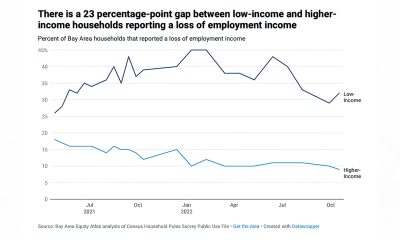Business
Economic Recovery Eludes Black Workers
By Freddie Allen
NNPA Senior Washington Correspondent
WASHINGTON (NNPA) – The slow-moving, uneven economic recovery continues to elude Black workers and some economists predict that even with a falling unemployment rate, at the end of 2015, Blacks will still be further away from full recovery than Whites.
A recent study by the Economic Policy Institute (EPI), a Washington, D.C.-based think tank focused on low- and middle-income families, said that in the fourth quart of 2014, the national unemployment rate for Whites was “within 1 percentage point of pre-recession levels, while the Black unemployment rate was 2.4 percentage points higher than it was at the end of 2007.”
The report also explained that, “True labor market improvements are more likely in those states experiencing both unemployment declines and increases in the share of workers employed,” also known as the employment-population ratio or EPOP ratio.
The study continued: “On the other hand, declining unemployment in those states without increasing shares of workers employed may suggest workers are simply dropping out of the labor force.”
Valerie Wilson, director of the Program on Race, Ethnicity, and the Economy for EPI, analyzed 2014 data for the unemployment rate, the EPOP ratio, and the long-term unemployment rate, and said that using the unemployment rate to determine the health of the labor market may be overstating the progress of the economic recovery in the U.S.
“Between 2013 and 2014, the annual black unemployment rate declined most in Arkansas (6.5 percentage points), Indiana (4.6 percentage points), and Tennessee (3.6 percentage points). Of these, only Arkansas had a significantly higher Black employment- to-population ratio in 2014 (from 46.8 to 50.1 percent),” stated the EPI report. “Among states for which reliable estimates could be calculated, 15 states experienced a significant decline in the Black unemployment rate between 2013 and 2014 and in six of those states the Black EPOP increased. On the other hand, between 2013 and 2014 the Black unemployment rate significantly increased in Missouri (3.2 percentage points) and Wisconsin (4.8 percentage points).”
With a Black population of 6.5 percent, Wisconsin recorded the highest annual jobless rate for Blacks in the U.S. in 2014 (19.9 percent).
Paul Randus, a columnist for MarketWatch.com, said that Scott Walker, the governor of Wisconsin and a Republican presidential hopeful, is known nationally, “as the governor who eliminated collective bargaining rights for most public employee unions in Wisconsin – and then beat back a recall motion over it.”
Randus wrote, “The win further emboldened Walker,” and that the governor recently signed a “right to work bill” that economists say will chip away at labor union power in the state. The policies were supposed to spur job and business growth, but the governor has fallen almost 100,000 jobs short of his 2010 pledge to create 250,000 jobs during his first term.
The anti-union policies in Wisconsin are a big problem for both White and Black workers in the Badger State, said Wilson.
Even though, Black workers in Virginia (19.7 percent Black population) experienced the lowest annual Black jobless rate in 2014 at 8 percent, it was still, “higher than the highest White rate of 7 percent in Nevada,” stated the EPI report. In the fourth quarter of last year, the 11 percent Black unemployment rate was, “higher than the national unemployment rate at the peak of the recession (9.9 percent in the fourth quarter of 2009).”
The Black jobless rate is expected to dip to 10.4 percent, by the fourth quarter of 2015, but that’s nowhere near the pre-recession unemployment level, which was 8.6 percent.
“In 2014, long-term unemployment among African American workers (39.7 percent) was the highest of any racial or ethnic group, although it was down 3.7 percentage points from 2013,” stated the report. “Among states with a large enough sample size for reliable estimates, only three had significant declines in long-term unemployment between 2013 and 2014: North Carolina (14.4 percentage points), Florida (10 percentage points) and Texas (8.2 percentage points). In 2014, the highest shares of long-term unemployed black workers were in the District of Columbia (56.3 percent), Illinois (52.7 percent), Alabama (48.9 percent) and New Jersey (48.6 percent).”
The U.S. economy added 126,000 jobs in March, far below analysts’ expectations, and the national unemployment rate was still 5.5 percent.
Wilson said that record-setting snow falls and cold temperatures suppressed hiring and demand consumption in March.
The Black jobless rate decreased from 10.4 percent in February to 10.1 percent in March, compared to the White unemployment rate, which was stagnant at 4.7 percent.
The unemployment rate for Black men over 20 years old decreased from 10.4 percent in February to 10 percent in March and the EPOP ratio also rose from 60.3 percent to 60.5 percent. The jobless rate for White men was 4.5 percent in February and 4.4 percent in March. The EPOP ratio was unchanged at 69.2 percent.
Wilson said that she will be keeping a close eye on the unemployment rate for Black women, which has increased over the last three months from 8.7 percent in January to 9.2 percent in February.
The EPOP ratio for Black women over 20 years old was 55.8 percent in March, the same mark recorded last month. The jobless rate for White women was 4.2 percent in February and March and the EPOP ratio was down 55.2 percent to 55 percent.
“The recovery has been moving at a less than optimal pace for the last five years, partly due to inadequate demand sufficient enough to drive job growth,” said Wilson. “We need strong job growth to continue beyond this year, if we’re going to see the Black unemployment rate drop significantly below 10 percent and get anywhere near what can be considered a recovery-level rate.”
###
Activism
Oakland Post: Week of April 24 – 30, 2024
The printed Weekly Edition of the Oakland Post: Week of April 24 – 30, 2024

To enlarge your view of this issue, use the slider, magnifying glass icon or full page icon in the lower right corner of the browser window. ![]()
Bay Area
State Controller Malia Cohen Keynote Speaker at S.F. Wealth Conference
California State Controller Malia Cohen delivered the keynote speech to over 50 business women at the Black Wealth Brunch held on March 28 at the War Memorial and Performing Arts Center at 301 Van Ness Ave. in San Francisco. The Enterprising Women Networking SF Chapter of the American Business Women’s Association (ABWA) hosted the Green Room event to launch its platform designed to close the racial wealth gap in Black and Brown communities.

By Carla Thomas
California State Controller Malia Cohen delivered the keynote speech to over 50 business women at the Black Wealth Brunch held on March 28 at the War Memorial and Performing Arts Center at 301 Van Ness Ave. in San Francisco.
The Enterprising Women Networking SF Chapter of the American Business Women’s Association (ABWA) hosted the Green Room event to launch its platform designed to close the racial wealth gap in Black and Brown communities.
“Our goal is to educate Black and Brown families in the masses about financial wellness, wealth building, and how to protect and preserve wealth,” said ABWA San Francisco Chapter President LaRonda Smith.
ABWA’s mission is to bring together businesswomen of diverse occupations and provide opportunities for them to help themselves and others grow personally and professionally through leadership, education, networking support, and national recognition.
“This day is about recognizing influential women, hearing from an accomplished woman as our keynote speaker and allowing women to come together as powerful people,” said ABWA SF Chapter Vice President Velma Landers.
More than 60 attendees dined on the culinary delights of Chef Sharon Lee of The Spot catering, which included a full soul food brunch of skewered shrimp, chicken, blackened salmon, and mac and cheese.
Cohen discussed the many economic disparities women and people of color face. From pay equity to financial literacy, Cohen shared not only statistics, but was excited about a new solution in motion which entailed partnering with Californians for Financial Education.
“I want everyone to reach their full potential,” she said. “Just a few weeks ago in Sacramento, I partnered with an organization, Californians for Financial Education.
“We gathered 990 signatures and submitted it to the [California] Secretary of State to get an initiative on the ballot that guarantees personal finance courses for every public school kid in the state of California.
“Every California student deserves an equal opportunity to learn about filing taxes, interest rates, budgets, and understanding the impact of credit scores. The way we begin to do that is to teach it,” Cohen said.
By equipping students with information, Cohen hopes to close the financial wealth gap, and give everyone an opportunity to reach their full financial potential. “They have to first be equipped with the information and education is the key. Then all we need are opportunities to step into spaces and places of power.”
Cohen went on to share that in her own upbringing, she was not guided on financial principles that could jump start her finances. “Communities of color don’t have the same information and I don’t know about you, but I did not grow up listening to my parents discussing their assets, their investments, and diversifying their portfolio. This is the kind of nomenclature and language we are trying to introduce to our future generations so we can pivot from a life of poverty so we can pivot away and never return to poverty.”
Cohen urged audience members to pass the initiative on the November 2024 ballot.
“When we come together as women, uplift women, and support women, we all win. By networking and learning together, we can continue to build generational wealth,” said Landers. “Passing a powerful initiative will ensure the next generation of California students will be empowered to make more informed financial decisions, decisions that will last them a lifetime.”
Business
Black Business Summit Focuses on Equity, Access and Data
The California African American Chamber of Commerce hosted its second annual “State of the California African American Economy Summit,” with the aim of bolstering Black economic influence through education and fellowship. Held Jan. 24 to Jan. 25 at the Westin Los Angeles Airport Hotel, the convention brought together some of the most influential Black business leaders, policy makers and economic thinkers in the state. The discussions focused on a wide range of economic topics pertinent to California’s African American business community, including policy, government contracts, and equity, and more.

By Solomon O. Smith, California Black Media
The California African American Chamber of Commerce hosted its second annual “State of the California African American Economy Summit,” with the aim of bolstering Black economic influence through education and fellowship.
Held Jan. 24 to Jan. 25 at the Westin Los Angeles Airport Hotel, the convention brought together some of the most influential Black business leaders, policy makers and economic thinkers in the state. The discussions focused on a wide range of economic topics pertinent to California’s African American business community, including policy, government contracts, and equity, and more.
Toks Omishakin, Secretary of the California State Transportation Agency (CALSTA) was a guest at the event. He told attendees about his department’s efforts to increase access for Black business owners.
“One thing I’m taking away from this for sure is we’re going to have to do a better job of connecting through your chambers of all these opportunities of billions of dollars that are coming down the pike. I’m honestly disappointed that people don’t know, so we’ll do better,” said Omishakin.
Lueathel Seawood, the president of the African American Chamber of Commerce of San Joaquin County, expressed frustration with obtaining federal contracts for small businesses, and completing the process. She observed that once a small business was certified as DBE, a Disadvantaged Business Enterprises, there was little help getting to the next step.
Omishakin admitted there is more work to be done to help them complete the process and include them in upcoming projects. However, the high-speed rail system expansion by the California High-Speed Rail Authority has set a goal of 30% participation from small businesses — only 10 percent is set aside for DBE.
The importance of Diversity, Equity and Inclusion (DEI) in economics was reinforced during the “State of the California Economy” talk led by author and economist Julianne Malveaux, and Anthony Asadullah Samad, Executive Director of the Mervyn Dymally African American Political and Economic Institute (MDAAPEI) at California State University, Dominguez Hills.
Assaults on DEI disproportionately affect women of color and Black women, according to Malveaux. When asked what role the loss of DEI might serve in economics, she suggested a more sinister purpose.
“The genesis of all this is anti-blackness. So, your question about how this fits into the economy is economic exclusion, that essentially has been promoted as public policy,” said Malveaux.
The most anticipated speaker at the event was Janice Bryant Howroyd known affectionately to her peers as “JBH.” She is one of the first Black women to run and own a multi-billion-dollar company. Her company ActOne Group, is one of the largest, and most recognized, hiring, staffing and human resources firms in the world. She is the author of “Acting Up” and has a profile on Forbes.
Chairman of the board of directors of the California African American Chamber of Commerce, Timothy Alan Simon, a lawyer and the first Black Appointments Secretary in the Office of the Governor of California, moderated. They discussed the state of Black entrepreneurship in the country and Howroyd gave advice to other business owners.
“We look to inspire and educate,” said Howroyd. “Inspiration is great but when I’ve got people’s attention, I want to teach them something.”
-

 Activism4 weeks ago
Activism4 weeks agoOakland Post: Week of March 27 – April 2, 2024
-

 #NNPA BlackPress4 weeks ago
#NNPA BlackPress4 weeks agoCOMMENTARY: D.C. Crime Bill Fails to Address Root Causes of Violence and Incarceration
-

 #NNPA BlackPress4 weeks ago
#NNPA BlackPress4 weeks agoMayor, City Council President React to May 31 Closing of Birmingham-Southern College
-

 #NNPA BlackPress4 weeks ago
#NNPA BlackPress4 weeks agoBeloved Actor and Activist Louis Cameron Gossett Jr. Dies at 87
-

 Community1 week ago
Community1 week agoFinancial Assistance Bill for Descendants of Enslaved Persons to Help Them Purchase, Own, or Maintain a Home
-

 Activism3 weeks ago
Activism3 weeks agoOakland Post: Week of April 3 – 6, 2024
-

 Business1 week ago
Business1 week agoV.P. Kamala Harris: Americans With Criminal Records Will Soon Be Eligible for SBA Loans
-

 Activism2 weeks ago
Activism2 weeks agoOakland Post: Week of April 10 – 16, 2024
























































